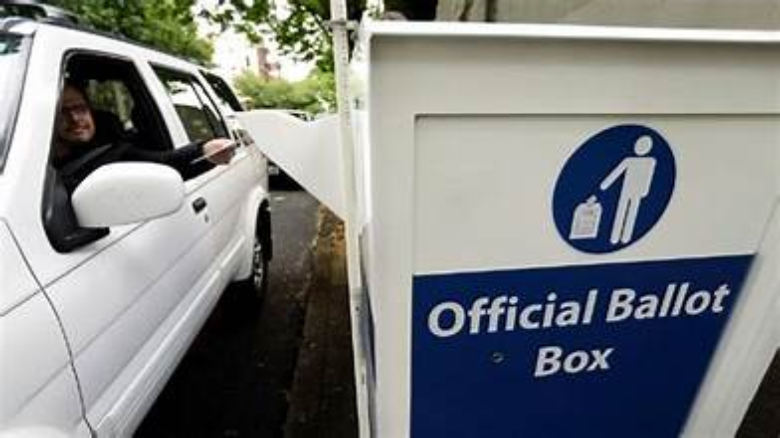Recent incidents in the Pacific Northwest involving the destruction of ballot drop-off boxes have raised serious concerns about potential election interference just days before Americans head to the polls. In Oregon and Washington, three ballot boxes have reportedly been set ablaze with incendiary devices over the last few weeks, destroying an unknown number of ballots. The latest attack occurred early Monday in Vancouver, Washington, where an explosive device was used to ignite a ballot box, raising alarms among local voters and prompting an urgent investigation by authorities.
These attacks have intensified worries over the security of the upcoming election, particularly in battleground districts like Washington’s 3rd Congressional District, where incumbent Democrat Marie Gluesenkamp Perez faces Republican challenger Joe Kent. With the Cook Political Report classifying the race as a toss-up, the stakes are high, and any threat to ballot security is being taken seriously. While no arrests have been made, investigators have gathered initial clues about the potential motives behind these incidents, which appear to go beyond random acts of vandalism.
The investigation into these incidents took a turn on Monday when police announced they had identified a suspect vehicle connected to the attacks. In Portland, Oregon, surveillance footage captured a Volvo stopping near a ballot box just moments before security personnel discovered a fire inside. According to Portland Police Bureau spokesperson Mike Benner, investigators are currently working to identify the individuals linked to the vehicle and are examining additional footage for potential leads.
Authorities also discovered incendiary devices at two of the scenes, each bearing a message, “Free Gaza,” indicating the arsonist or arsonists may be motivated by an anti-Israel agenda. While officials have yet to name a suspect, the messaging hints that the attacks might be politically motivated, possibly connected to recent tensions surrounding Middle Eastern conflicts.
Law enforcement agencies have been examining whether there is a broader strategy behind these incidents, especially since federal officials have been on high alert for election-related disruptions. Homeland Security had warned months ago about the potential for such threats, with intelligence reports revealing discussions online about targeting ballot boxes with incendiary materials.
The Department of Homeland Security (DHS) had previously cautioned about the risk of incendiary devices being used against ballot drop boxes in the lead-up to the election. In a bulletin released in July, DHS advised that intelligence reports indicated some groups were considering using “incendiary and explosive materials” to damage or destroy ballots. The advisory also noted that online platforms had surfaced discussions about methods for attacking ballot boxes, mentioning tools such as cherry bombs, gasoline, and lighting gels.
The DHS warning was not specific to any one region, but these recent incidents in the Pacific Northwest now appear to validate the agency’s concerns. Federal authorities have since been coordinating with local law enforcement to prevent further disruptions, including deploying additional surveillance resources to high-risk areas.
The timing and location of these incidents have led to speculation about their impact on election integrity and voter confidence, particularly in key battleground states. Washington’s 3rd Congressional District, where one of the fires occurred, is among the races where Republicans are expected to perform strongly. The attacks have understandably alarmed residents, especially with Election Day just around the corner, and some fear that similar incidents may discourage voters or disrupt the collection of ballots.
Security experts warn that these incidents could create chaos and erode trust in the electoral process if such disruptions continue. However, authorities stress that each ballot box is being monitored closely, and damaged ballots, when possible, are being counted if they can be verified. In response, law enforcement is increasing security around ballot drop-off locations in the area and throughout Washington and Oregon to assure voters that steps are being taken to protect their votes.
These incidents have prompted a broader conversation about the potential for politically motivated violence aimed at disrupting the election. Voter intimidation and election security are sensitive issues, especially given heightened polarization in recent years. Concerns over international influences on U.S. elections have only added to fears of domestic interference.
While the arsons in Oregon and Washington remain under investigation, some analysts worry these attacks may only be the beginning of attempts to interfere with the electoral process. The incendiary messages left at the scenes underscore the range of motivations that might be at play, including the possibility of ideologically driven actions targeting the election infrastructure.
In the wake of these attacks, local officials are working closely with federal agencies to identify any suspects and prevent further incidents. DHS is particularly concerned about election day, given that these incidents have increased as early voting and absentee ballot submissions have surged. With federal, state, and local collaboration, DHS and election boards across the U.S. are intensifying security measures around ballot drop boxes.
For now, residents of Washington and Oregon are urged to continue submitting ballots via secure, monitored boxes or directly at polling locations if they feel uneasy about drop-off boxes. Local election officials continue to work diligently to maintain the integrity of the vote and assure voters that every effort is being made to count ballots accurately, even in light of these recent incidents.
As authorities work to get to the bottom of these attacks, they are urging voters to remain calm and vigilant. The importance of protecting the electoral process from disruptions and interference remains a top priority for both law enforcement and election officials. For many, these incidents serve as a reminder of the critical role that ballot security and transparency play in maintaining trust in the democratic process.
While the investigation continues, security measures are being strengthened to ensure a smooth and safe voting experience for all voters, reminding the public that, despite attempts at disruption, safeguarding the right to vote remains paramount.


Funny how this happens in Blue Run states. How long before they catch the perpetrator, whose ballots were destroyed? Thats the reason that it’s important to vote in person.